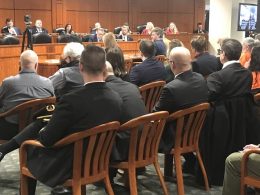LANSING, Mich. — Michigan Governor Gretchen Whitmer’s administration has unveiled a new $80 billion budget proposal for the state’s fiscal year 2026. The plan, presented to a joint session of the Senate and House appropriations committees, aims to address a range of critical issues, from economic growth to educational support, and affordability for Michigan residents.
Governor Whitmer emphasized that the proposed budget is designed to prioritize “kitchen table issues” that have a tangible impact on the daily lives of Michiganders. In a statement, the Governor said, “This commonsense budget will lower costs, create good-paying jobs, grow our economy, improve academic results, and support Michigan seniors. Together, I know we can find common ground and deliver another balanced, bipartisan budget.”
Key Proposals in the Budget
Among the 10 major proposals in the budget, some of the most notable include:
- Continued Support for Working Families:
- The budget includes the continuation of the Working Families Tax Credit, which has already provided an average of $3,500 to 650,000 families. This tax relief program has been especially beneficial for households with children, covering nearly half of all kids in Michigan.
- Early Childhood Education:
- Whitmer’s plan ensures free pre-kindergarten education for every four-year-old in Michigan, saving families up to $10,000 per child. Additionally, the proposal introduces a pilot program for three-year-olds, aiming to serve approximately 4,000 children by 2029.
- Affordable Housing Initiatives:
- The budget allocates over $2 billion for affordable housing, marking the largest investment in the state’s history in this sector. This funding will support the creation or rehabilitation of nearly 11,000 housing units, helping to alleviate demand and lower housing costs.
- Support for Education:
- On education, the budget includes a 4.1% increase in per-pupil funding, raising the total to $10,000 per student. The plan also directs $202.4 million toward special education and $258 million to enhance students’ mental health services. A new initiative, the Students, Metrics, and Results with Transparency (SMART) Plan, will be introduced to provide greater visibility into student outcomes and keep parents better informed about their children’s academic progress.
- Investments in Seniors and Disability Programs:
- For Michigan’s senior citizens, the budget proposes rolling back the retirement tax and increasing funding for medical care and nursing homes. Additionally, the MiABLE program, which helps individuals with disabilities save for future expenses, would see expanded resources.
- Environmental and Public Health Measures:
- In an effort to combat rising living costs, the budget includes provisions for water affordability and energy assistance. The state also plans to dedicate $80 million to improving clean drinking water across Michigan.
- Road and Infrastructure Funding:
- With a focus on creating jobs, the budget earmarks $4.9 billion for road repairs, bridge improvements, and transit programs. This includes $767 million for continued transit and rail development, as well as millions of dollars for state parks and infrastructure upgrades.
- Addressing Price Gouging:
- A new initiative will be introduced to combat price gouging, with the formation of a dedicated price gouging team within the Michigan Attorney General’s office.
Fiscal Management and Government Efficiency
Governor Whitmer’s budget also proposes several measures to improve the efficiency of state government. A significant portion of the budget, approximately $46 million, would go toward modernizing the state’s IT infrastructure, while additional investments would support trial court operations and the transition to a new psychiatric hospital.
The Governor’s office has laid out the proposal under four main goals: lowering costs, creating jobs, enhancing education, and supporting seniors, while also ensuring the state remains safe and efficient. A particular focus is placed on reducing unnecessary spending and ensuring that every dollar is spent in ways that directly benefit Michigan residents.
The Road Ahead
While the proposed budget offers a comprehensive plan to address Michigan’s most pressing issues, it is still in the early stages of the legislative process. Lawmakers, particularly in the newly Republican-controlled House, will likely offer their input, revisions, and potential opposition. The state’s legislature is expected to review and approve the final budget by July 1, ahead of the start of the fiscal year on October 1.
Governor Whitmer, who did not attend the budget presentation in Lansing, instead held an event at Grand Rapids Community College to spotlight the Michigan Reconnect program, which offers tuition-free community college education to adult residents.
As discussions over the budget continue, Michigan residents can expect further updates on how their lawmakers will prioritize spending in the coming months.












